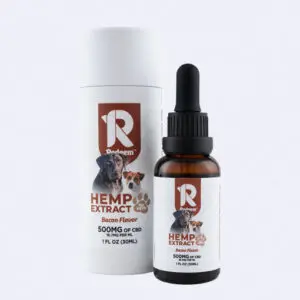Your Cart Details
By Redeem | Jun 15, 2021
5 Veterinarians Give Advice on CBD for Cats & Dogs
5 Veterinarians Give Advice on CBD for Cats & Dogs
By Redeem | Jun 15, 2021
We spoke with five veterinarians who say that CBD for cats & dog have been found to be extremely safe and highly-effective at relieving symptoms for a wide-range of conditions affecting both dogs and cats.
While Cannabis has documented health benefits and uses dating back ages, CBD oil is a relatively modern, holistic approach to therapeutic relief.
It has recently gained popularity among pet-owners seeking to replace modern pharmaceuticals with a more natural therapy to help their dog and cat with certain health issues.
Some of the most common conditions include:
- Pain and soreness
- Neurologic issues (such as seizures)
- Appetite / Gastrointestinal issues (acute or chronic)
- Stress and anxiety
- Inflammation
- Aggression
- Arthritis
Studies are still being done to determine all of the benefits CBD oil can have for dogs.
How Does CBD Work in Pets? Can They Overdose?
Dr. Gary Richter, a Veterinary Health Expert with Rover, is a leading expert in CBD for pets. Since 2002, he has been the owner and medical director of Montclair Veterinary Hospital in Oakland, California, and he launched Holistic Veterinary Care in 2009.
Dr. Richter has an extensive background with CBD and its effects on dogs, and has even been published on the subject. We asked Dr. Richter how CBD can help dogs, and if there are any concerns related to dogs or pets taking CBD.
“CBD has much the same effect in animals as it does in people. CBD affects the endocannabinoid system, which is a system of neurotransmitters in the body that helps balance and maintain normal body function. This includes helping with pain, inflammation, anxiety, arthritis, and others,”
Dr. Richter explains.
“There are no concerns regarding toxicity or overdose from medicine containing predominantly hemp-derived CBD. The worst case scenario from a CBD-only standpoint is it could potentially make the animal a little sleepy. That’s about as bad as it would be expected to get. But as I often tell people, any medication or supplement can potentially cause an upset tummy.”
What Should I Avoid When Giving CBD to Dogs and Cats?
Dr. Heather Venkat, DVM, MPH, DACVPM is the Companion Animal Veterinarian with VIP Puppies. We asked Dr. Venkat what a pet owner should be weary of when using CBD for dogs and cats for the first time.
“Dogs might vomit or have diarrhea if given too much CBD oil or on an empty stomach,” says Dr. Vemkat. She recommends that you start out small and see how your dog reacts before giving a higher amount.
“Veterinarians are still studying all of the potential side effects of CBD oil in dogs with other medical conditions, such as heart problems or cancer. It is best to avoid giving CBD oil to your dog if they have these conditions until you discuss what is safe with your veterinarian,” says Dr. Venkat.
“I would also recommend avoiding giving your dog any human CBD products; only buy formulations made specifically for dogs. Look for companies that sell high-quality CBD products rather than a neighbor or friend, to ensure consistency and safety in the product’s manufacturing and processing. Also, avoid CBD oil containing xylitol, an artificial sweetener that can cause dangerously low blood sugar in dogs.”
Dr. Venkat
If CBD for Cats & Dogs is Safe, Why Won’t My Vet Talk To Me About It?
Dr. Michelle Burch, DVM, is the doctor on staff at Safe Hounds Pet Insurance, who we spoke to about the possible confusion surrounding CBD and Veterinarians.
While CBD use in pets does show promise in things like pain management, seizure control, reduction of anxiety, and improved appetite, Dr. Burch says it is still too new for many veterinarians to feel comfortable recommending it.
“The 2018 Farm Bill removed hemp and its derivatives, including CBD with less than 0.3% THC, from the Controlled Substances Act. Unfortunately, state and federal law concerning veterinarians counseling, recommending, or prescribing the use of CBD is murky at best. Additionally, at this time, the FDA has not approved any veterinarian product with CBD for use in animals,” says Dr. Burch.
While the FDA hasn’t approved any CBD for cats and dogs, they don’t need FDA approval to be legal. Many products are legal without FDA approval such as animal supplements, medical feed and compounded drugs. This means that animal supplements like glucosamine tablets, fish oil and CBD that veterinarians carry in their practices do not require FDA approval to be legal.
There are many vets in the USA currently recommending and even selling high-quality CBD products. If your vet won’t talk about it, it is likely due to misunderstanding or personal beliefs regarding marijuana.
“Unfortunately, in veterinary medicine we have to wait until federal law and peer-reviewed research catches up with state law,” says Dr. Burch.
How Do I Find the Right Dose of CBD for my Dog?
Dr. Sarah Wooten, DVM, CVJ, is the veterinarian on staff at Pumpkin Pet Insurance, a pet care company on a mission to make the best pet care possible for all. Dr. Wooten says the standard therapeutic dose range for CBD in dogs is 0.1-2 mg/kg.
“You can go as high as 5 mg/kg twice daily,” says Dr. Wooten, “however this should be done under the supervision of a veterinarian because there are some gastrointestinal side effects noted with higher dosages (vomiting, diarrhea). Not all dogs will respond to CBD the same way, so this dosage needs to be adjusted on a case by case basis, and the best way to do that is with a veterinary professional that is well versed in CBD products.”
CBD for cats and dogs is usually administered via orally. Although there are MANY forms of CBD for cats and dogs to choose from (including chews, biscuits, powders, oils, capsules, topicals, transdermals, vaporizers, concentrates, suppositories, or nebulizers). According to Dr. Wooten, there is no consensus on which form is the best.
“Transdermal and products that use inhalation have not been studied and do bypass first-pass metabolism, so use caution when using CBD products that utilize this route. Oral administration of CBD oil for dogs seems to be the route that maintains the most consistent levels of CBD oil in the bloodstream.”
For neuropathic pain, Dr. Wooten says the lower dosages of CBD are considered effective. For chronic pain conditions, like osteoarthritis, higher dosages, such as 1-2 mg/kg is recommended twice daily to start, and then once the dog starts feeling better, titrate the dosage down to 0.5 mg/kg twice daily, as needed to control pain.

Where Can I Get High-Quality CBD Oil for Dogs & Cats?
CBD can come in a variety of types and products, including treats, capsules, and oil. Some owners report CBD oil being easier to give to their dog because they can put a drop or two on their food. Other owners report the CBD treats are more tolerated by their dogs. Find the best CBD for your cat or dog and what works best for you!
Dr. Wendy King of Spears Creek Veterinary Clinic in Elgin, South Carolina has been practicing for over 20 years and is known as the “Pet Expert” for her local station WIS-TV. She is a proud advocate of CBD for dogs and cats.
“When picking the CBD for your dog, make sure you are looking at a trusted company that provides the unbiased, third-party test results for every batch of their product,” says Dr. King. “I recommend Redeem Therapeutics because their quality and price goes unmatched, they are a local company and they share the same values that I do.”
Dr. King sells Redeem Therapeutics CBD for Cats and Dogs in her veterinary clinic and has used it on herself, her own dogs and her patients.
“Read reviews thoroughly. Don’t try to buy the cheapest things you find. Although, high price doesn’t necessarily mean high-quality, either,” says Dr. King.
 CBD Gummies
CBD Gummies CBD Oils
CBD Oils CBD Capsules
CBD Capsules CBD Cream
CBD Cream CBD for Pets
CBD for Pets CBD + THC Gummies
CBD + THC Gummies Delta 8 Gummies
Delta 8 Gummies Delta 8 Capsules
Delta 8 Capsules Full Spectrum CBD Oil
Full Spectrum CBD Oil  THC Drops
THC Drops Stress
Stress

